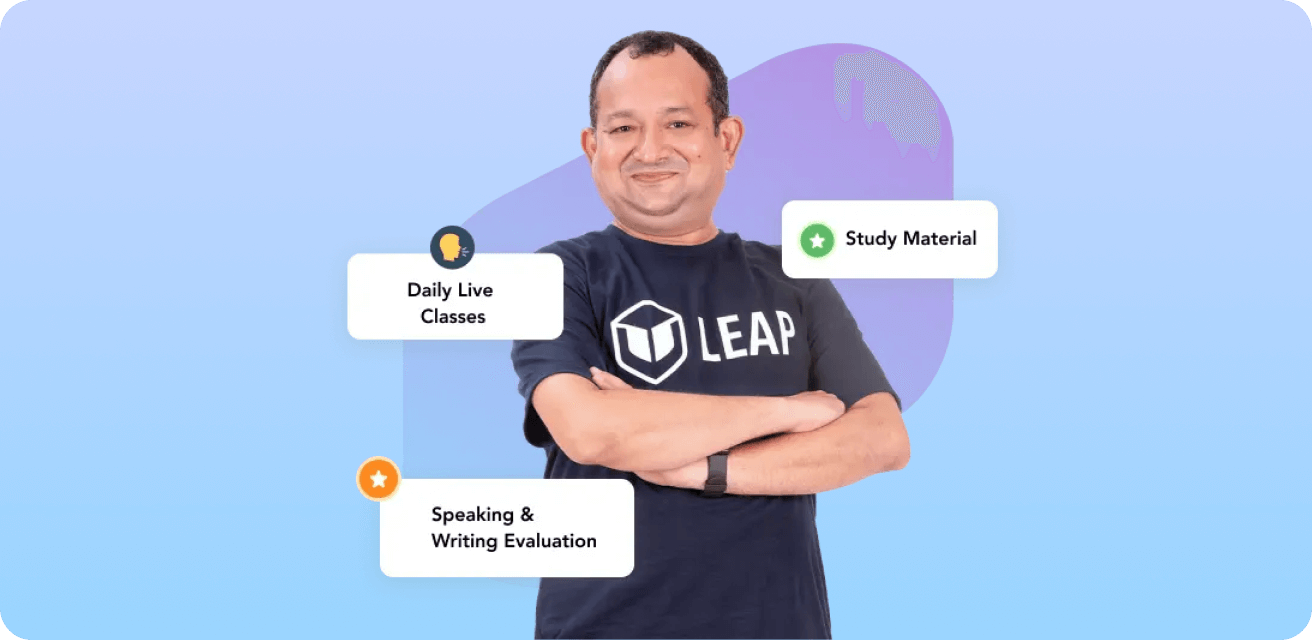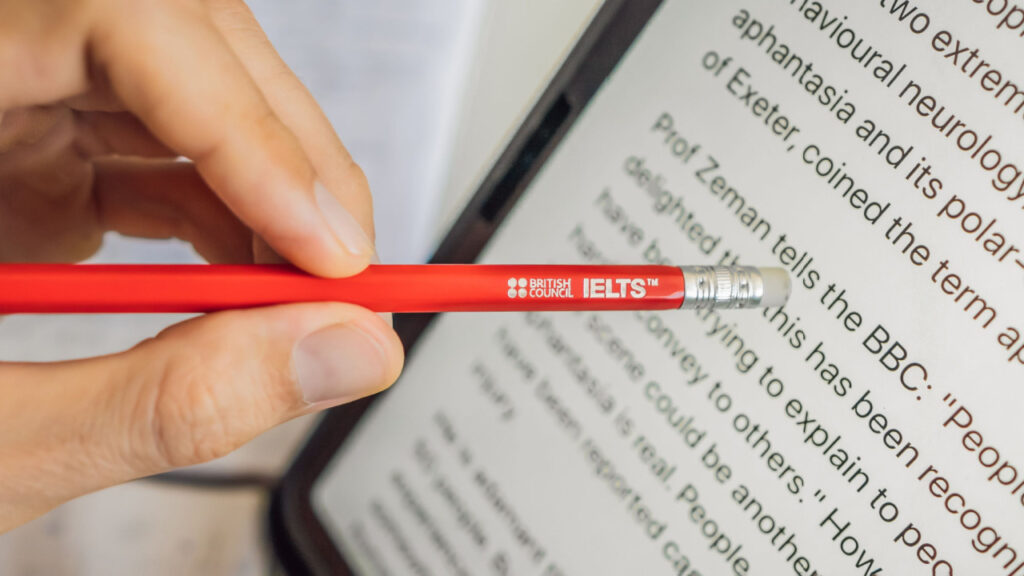Welcome to our blog on IELTS Academic Reading! This blog will discuss the reading material and practice tests that will help you prepare for the IELTS Academic Reading test.
The IELTS Academic Reading test is designed to assess your reading skills in an academic context. It includes texts from books, journals, magazines, and newspapers and covers various topics from science and technology to social issues and the arts.

Consult IELTS Expert for a Free Personalised Learning Plan
Improve your IELTS speaking score with a 1:1 consultation.
This blog will provide the resources you need to improve your reading skills and achieve your desired IELTS Academic Reading test score.
| Type of IELTS | Academic |
| Sections in IELTS Reading | 3 |
| Time allotted | 60 minutes |
| Number of Questions | 40 |
Let’s explore!
IELTS Reading Pattern
The IELTS reading test is 60 minutes long. You will be given 3 – 4 passages to read during this time. The 1st passage is usually the easiest, but the difficulty level increases with each passage. You will receive an answer sheet and a set of 40 questions. You should choose the correct answer and enter it separately with the corresponding question numbers on the answer sheet.
The IELTS reading test requires a lot of practice. The test may be simple, but the completion and precision of answering the questions can be daunting. Getting an IELTS mentor to help you through the process is always best.
Improve Your IELTS Reading Vocabulary
This is the first and most important step. Quite often, the IELTS candidates are unable to comprehend the passage. This is the most crucial step to answer the questions accurately.
Sometimes, you might be required to read the passage multiple times only to understand the essence of the passage. This can be a time-consuming process, which is not desirable.
You would be required to work on your reading skills with expert techniques to quickly glance through the passages and understand them as you move forward. This process would be an efficient one if you worked on your vocabulary.


Want to Score 7+ IELTS Band in 4 Weeks?
5L+ students across India have signed up for Leap’s Masterclass to date.

Want to Score 7+ IELTS Band in 4 Weeks?
5L+ students across India have signed up for Leap’s Masterclass to date.
Steps to Improve IELTS Reading Vocabulary
- Start by learning at least 3 new words per day. Learn their synonyms, too, to improve your accuracy. Move on to learning at least 10 words per day. Read professionally written material to improve your vocabulary.
- Learn root words predominantly used with prefixes and suffixes to make new words. For instance, let us look at the root word “judge.” You can add suffixes to form “judgement,” ”judged,” and” judgeship”. You can also use its synonyms with the base word infused into it to make “adjudicate.”
- Don’t be intimidated if an article has difficult words. This is the best way to improve your vocabulary for the IELTS reading test. Pick up an online or offline dictionary and start learning the words.
- Don’t read simple articles and blogs that do not help you improve your proficiency in English. Read challenging material that inspires you to learn more. If you do not understand something, look it up online or in a dictionary.
- The IELTS reading test requires you to put in the effort. Reading simple words and sentences doesn’t challenge you enough to expand your vocabulary.
- Practice implementing the new words you learned in sentences when you speak or write. This will help you remember the words and their correct uses.
- Simply memorising the words is ineffective when reading or listening to them. It takes time to comprehend the meaning, which could cost you valuable time during the test.
IELTS Reading Practice Tips
When preparing for the IELTS Academic Reading test, there are a few key tips to keep in mind:
- Identify your strengths and use them to your advantage. For example, if you are a strong reader, focus on improving your ability to quickly and accurately answer questions. If you struggle with vocabulary, spend extra time learning new words and their synonyms.
- Read challenging material that inspires you to learn more. Don’t be intimidated if an article has difficult words – this is the best way to improve your vocabulary for the IELTS reading test. Pick up an online or offline dictionary and start learning the words.
- Read the questions first before reading the passages. This way, you can look for the answers as you read the passage, saving you time and ensuring you don’t miss any important information.
- Focus on answering the longer summary questions first. This serves the purpose of understanding the material thoroughly for subsequent questions.
- Practice implementing the new words you learned in sentences when you speak or write. This will help you remember the words and their correct uses, and make it easier for you to recognise them in the reading test.
Take Multiple Practice Tests
The best way to ace the IELTS reading test is through lots and lots of practice. Find online practice tests or buy the IELTS books that help you practice previous questionnaires. Always time your practice tests for the best results.
You can also take the practice tests with a trainer who will help you fine-tune your reading skills and read efficiently. Expert IELTS mentors at Leap Scholar are dedicated to providing you with as many practice tests as possible. They help you practice reading and understanding the passages quickly and provide guidance during your practice tests for higher proficiency.
Summing Up
When preparing for the IELTS Academic Reading test, it’s important to identify your own strengths and use them to your advantage.
Remember to consistently practice and review your progress to identify areas for improvement and build your confidence for test day. With dedication and strategic preparation, you can achieve success on the IELTS Academic Reading test.
For more guidance on IELTS Academic Reading, you can reach out to our Leap IELTS Expert Team.
Frequently Asked Questions (FAQs)
Q. How to calculate the band score in the IELTS reading test? title
Ans. The band score for the IELTS reading test is based on the number of correct answers out of 40. Each question that you answer correctly, awards you one point. The number of correct answers is subsequently converted into the band score based on the overall reading test results of all test-takers on that particular day.
Q.How to save time in the IELTS reading test?
Ans. Follow the steps below to save time during your IELTS test so you can answer all the questions- Read the questions before you read the passages, Practice skim-reading and speed-reading techniques, highlight keywords and important points as you go along.
Q. Are the IELTS reading test patterns the same for General and Academic tests?
Ans. The overall pattern of the IELTS reading test is the same for both Academic and General Tests. However, the quality and type of text provided for each exam type are different. Since the Academic IELTS test-takers are preparing for further education, the texts provided for them are also of an Academic nature.
Q. How many correct answers should you get to achieve a Band score of 7 or higher?
Ans. The IELTS band scores are based on the performance of all the candidates who took the test on that particular day. A nominal 30/40 is usually good to attain a score of 7 or higher. If the test was surprisingly easy, as evidenced by the score of other candidates, then you might need to get more than 30 correct answers. Similarly. If the test was more difficult for a majority of candidates, then you will need less than 30 correct answers for a band score of 7.
Q. What are the types of questions in the IELTS Reading Test?
Ans. The IELTS reading tests pose the following types of questions- Multiple-choice questions, true and false, match the following (Information, sentences, and headings), short answers.
Q. Where are the IELTS passages taken from?
Ans. These texts are selected from newspapers, academic journals, books, academic magazines, and academic articles. The texts provided for the General IELTS test are more mainstream. They are selected from newspapers, instruction manuals, documents, flyers, advertisements, and other general sources.
Q. How to score well in IELTS Reading?
Ans. You should strive to get as many correct answers as you can, regardless of the benchmark. This is because it is difficult to anticipate exactly how difficult or easy the test is for other candidates. The variable is unstable, so don’t put your hopes on 30 correct answers. Answer all the questions as accurately as possible.
Q. How many words should I aim to read per minute to manage the time effectively?
Ans. The average adult reading speed is around 200-300 words per minute. However, this can vary depending on the individual’s reading ability and the complexity of the material being read. To manage your time effectively, it’s important to set a realistic reading pace that allows you to comprehend and retain the information while also keeping up with your schedule.
Q. What are the 4 types of reading?
Ans. The four types of reading are skimming, scanning, active reading, and critical reading. Skimming is quickly looking over a text to get a general idea, scanning is searching a text for specific information, active reading involves engaging with a text, and critical reading involves analyzing and evaluating a text.
Q. What types of texts can I expect in the IELTS Academic Reading test?
Ans. The IELTS Academic Reading test includes texts that are taken from books, journals, magazines, and newspapers. The texts are generally academic in nature and cover a wide range of topics, such as science, technology, social issues, history, and the arts. The texts can be descriptive, factual, or analytical in nature.The reading passages can be up to 2,500 words long, and the test includes three sections with a total of 40 questions.
Q. What strategies can I use to handle long and time-consuming questions in the IELTS Academic Reading test?
Ans. To handle long and time-consuming questions in the IELTS Academic Reading test, break down the question, highlight keywords, use skimming and scanning, read the question carefully, guess and move on, and review your answers. Managing your time effectively and developing effective reading strategies is key to success in the test.
















Have Questions? Get Guidance to reach your Dream University
Connect with India's finest counsellors and biggest study abroad community.